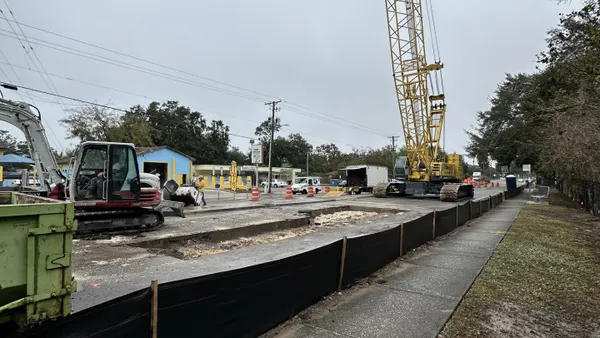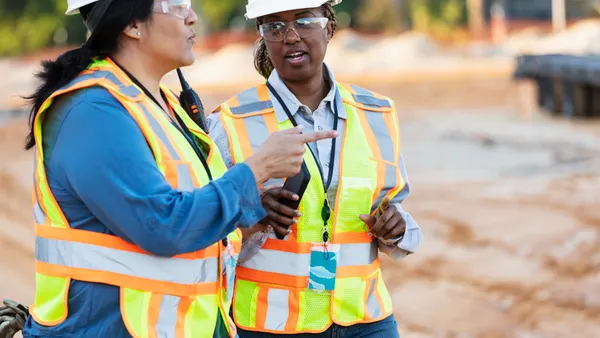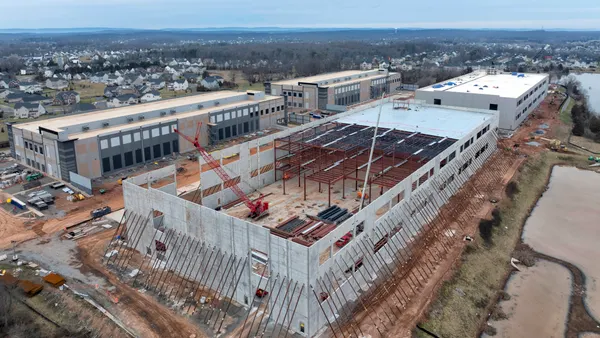Dive Brief:
- Los Angeles-based Tutor Perini, the seventh largest contractor in the country, took a hit to both its revenue and profits in the third quarter due to its public sector clients not paying their bills amid funding uncertainty as the infrastructure bill languishes in Congress, according to Ron Tutor, chairman and CEO.
- The firm's revenues fell 18% to $1.18 billion, down from $1.44 billion a year ago and also off from the $1.22 billion it reported a quarter ago, according to the firm's Q3 results. Operating income fell by 37% to $52.09 million, down from $83.02 million a year ago.
- The firm's backlog, or projects that it has won but hasn't started yet, rose to $8.41 billion in the quarter, or 11.8%, from $7.52 billion in Q2, but was down from the $9.18 billion it reported a year ago. The firm dropped its earnings guidance to a range of $1.70 to $1.85 per share, down from $1.80 to $2.20 per share in the second quarter.
Dive Insight:
Asked by analysts during a conference call what would help the firm's revenues recover, Tutor was blunt: "Passage of the infrastructure bill," he said.
To illustrate the difficulties the firm has been having collecting money from its public sector clients, Tutor walked analysts through a deal he struck on one large payment due.
"We agreed to lend the owner back $28 million that he could pay us on a large public works project and pay 6% interest, and gave him over a year to pay us back," Tutor said. "That's the kind of madness we're dealing with."
That lack of payments forced Tutor Perini to burn through more of its own cash in the quarter to cover its customers' unpaid bills. The firm used $21 million in operating cash, according to Gary Smalley, the firm's chief financial officer.
"Covid has constrained some of our customers' revenue and funding sources, thereby limiting their ability and budgetary discretion to pay us timely for certain in scope work, as well as some out of scope work that we have performed at their direction," Smalley said. "As a result, we have had to temporarily fund certain project costs that would normally be more promptly negotiated, billed to and collected from these customers, which has negatively impacted our operating cash flow."
The company's tone and outlook was in stark contrast to just two quarters ago, when the COVID-19 pandemic seemed to be on the wane, and optimism was high for an infrastructure bill to be passed this year.
There were some positive numbers in the firm's results. Tutor Perini highlighted the 11.9% year-to-date operating margin for its civil segment, which is up 100 basis points from a year ago. The firm said it landed $2.1 billion in new awards during the quarter, including:
- The Cedars-Sinai Marina del Rey Replacement Hospital project in California.
- The $471M LAX Airport Metro Connector project.
- The $220M I-70 Missouri River Bridge project.
- A $122M military range project in Guam.
- A $98M military housing project in Guam.
Tutor also said the firm was awaiting decisions on a further $7.5 billion in new projects it bid in the last 45 days, including:
- The +$3B JFK Terminal One project.
- The +$2B Maryland Purple Line project.
- And the +2B Metro North Penn Station Access Project in New York City.
Even though the firm also lost in its bid for the $1.6 billion Portal North Bridge project in New Jersey to a joint venture of Skanska/Traylor Bros. last month, Tutor said that in contrast to smaller contractors, the firm wasn't seeing a hypercompetitive bid environment for major projects.
"The projects I spoke to had no more than a total of three bidders, and in most cases two, which should continue to lead to strong operating margins and growth for our civil segment," Tutor said.
He anticipates pent up demand, and an even swifter bid environment, should an infrastructure bill get passed and if the COVID-19 pandemic abates.
"My assumption is by next summer, we will have achieved such a significant backlog, beyond anything we ever dreamt of," Tutor said. "As that catches up, our revenue will increase accordingly, and with it, the profit. But the work has got to get released, COVID's got to get put behind us, and these government fundings have to happen."












